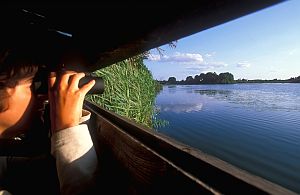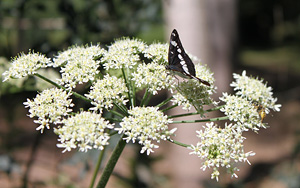News
SPIRAL "UK National Ecosystem Assessment" paper publshed
A new paper has been published based on work carried for SPIRAL, authored by Kerry Waylen and Juliette Young. This paper focuses on the first phase of the UK National Ecosystem Assessment.
Upcoming Event
No upcoming events.
News
The future's bright for environmental citizen science
Sun, 09/11/2011 - 09:58 — Koen Van MuylemA review of a decade of environmental citizen science – where the general public are involved in science as researchers – concludes that its benefits to science and society far outweigh concerns over data quality. Challenges can be overcome through volunteer training and should not be used to devalue citizen science programmes, say the researchers.
 Community-Based Monitoring (CBM) schemes have increased in popularity worldwide over the last decade.
Community-Based Monitoring (CBM) schemes have increased in popularity worldwide over the last decade.
Biodiversity loss: prevention is cheaper than cure
Mon, 08/01/2011 - 11:08 — Koen Van MuylemA proactive approach to biodiversity loss – where conservation of a species starts before it becomes endangered – could save millions of euros compared to the cost of recovering a population already in serious decline, according to new research.
Conservation usually involves restoring populations to previous numbers with reactive measures, such as captive breeding programmes, relocation or predator control. However, proactive steps to preserve habitat, such as setting up conservation areas or banning property development, can prevent a vulnerable species from ever reaching critical status.
The study urges policy makers to consider proactive, rather than reactive, conservation as a cost-effective way to meet biodiversity targets under the EU Habitat Directive (1). The proactive approach is usually less popular with policy makers than ecologists. However, this is because the costs are often perceived to outweigh the visible benefits.
How will biodiversity loss compromise Earth's life support systems?
Sun, 07/17/2011 - 13:16 — Koen Van Muylem
Scientists have evaluated two decades of research into declining biodiversity and concluded unequivocally that loss of species richness leads to a reduction in how well ecosystems function. The researchers evaluated the evidence for key biodiversity theories and predicted that scientific progress in the next five to ten years will provide the information we need to efficiently conserve certain ecological processes.
Over a century ago, Charles Darwin proposed that the number of species present in an ecosystem determines how productive it is (i.e. how much organic material (biomass) it produces) - since each species fulfils a particular function. This is commonly known as the 'niche partitioning' theory.
Citizens encouraged to help monitor wild bird species
Fri, 05/20/2011 - 08:13 — Koen Van Muylem
The public can help assess the human impact on wild birds through amateur 'citizen science' networks, according to new research. Scientists evaluated the suitability of data collected by amateur bird-watchers for long-term monitoring of European bird populations. Their findings suggest that citizen data may significantly improve the accuracy of existing official survey methods, as well as help increase public awareness of wild bird conservation.
Priorities for conservation revealed in European survey
Fri, 05/13/2011 - 14:10 — Koen Van MuylemConservation efforts should focus on species that have recently declined in number, are harmless or are perceived as high value, according to a European public survey. Participants also felt that disappearing habitats should be targeted for protection. The results suggest that, by choosing different criteria that more closely match the public's values and criteria, conservationists could improve public support for their work.
Public support for conservation initiatives can ensure they are implemented more effectively, but this support could be undermined if the public disagree with conservation managers about the most important priorities for conservation.
Biodiversity in decline, but conservation efforts making a difference
Fri, 01/07/2011 - 09:28 — Koen Van MuylemOne-fifth of the world's mammals, birds, amphibians, reptiles and fish are threatened with extinction, according to a recent report. The study notes that there have been many conservation success stories, but far greater long-term resources are needed to improve the outlook for the world's threatened vertebrate species.
Biodiversity is of great cultural and economic importance for human society, but ecosystems can collapse if key individual species become extinct. Species found on the International Union for Conservation of Nature (IUCN) Red List of Threatened Species are classified into eight categories, according to how close they are to becoming extinct. Species listed as 'Critically Endangered', 'Endangered' or 'Vulnerable' are collectively known as 'Threatened species'.
Using information from 25,780 species of vertebrates (mammals, birds, amphibians, reptiles and fishes) on the IUCN Red List, an international team of researchers has assessed the changing conservation status of vertebrates around the world. In all, almost one-fifth of living vertebrate species are classed as Threatened.
IPBES Established
Tue, 12/21/2010 - 17:11 — Koen Van Muylem A new international body aimed at catalyzing a global response to the loss of biodiversity and world's economically-important forests, coral reefs and other ecosystems was established at the end of 2010 by governments at the United Nations 65th General Assembly (UNGA). The adoption, by the UNGA plenary, was the last approval needed for setting up an Intergovernmental Platform on Biodiversity and Ecosystem Services (IPBES). Governments gave a green light to its establishment in June at a meeting in Busan, Republic of Korea, coordinated by the UN Environment Programme (UNEP), but this required a resolution to be passed at the UNGA.
A new international body aimed at catalyzing a global response to the loss of biodiversity and world's economically-important forests, coral reefs and other ecosystems was established at the end of 2010 by governments at the United Nations 65th General Assembly (UNGA). The adoption, by the UNGA plenary, was the last approval needed for setting up an Intergovernmental Platform on Biodiversity and Ecosystem Services (IPBES). Governments gave a green light to its establishment in June at a meeting in Busan, Republic of Korea, coordinated by the UN Environment Programme (UNEP), but this required a resolution to be passed at the UNGA.
The independent platform will in many ways mirror the Intergovernmental Panel on Climate Change (IPCC) which has assisted in catalyzing worldwide understanding and governmental action on global warming.
- « first
- ‹ previous
- 1
- 2
- 3
- 4




